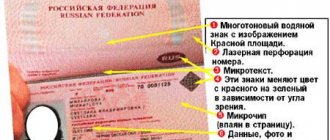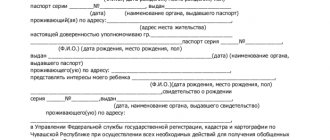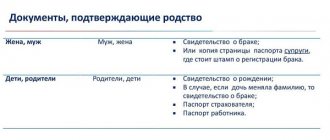When is consent required for a child to travel abroad?
According to current legislation, a minor citizen of the Russian Federation can travel abroad:
- With two parents (legal representatives);
- With one parent (legal representative) upon reaching 14 years of age;
- Alone without parents, or accompanied by another person.
As a general rule, if a child goes abroad, accompanied by one parent, adoptive parent, guardian or trustee, then the notarized consent of the second parent for the child’s departure according to the laws of the Russian Federation is not required. There are exceptions to this rule:
- In the event that the second parent has received a duly completed statement that he does not agree with such a departure.
- The legislation of the host country provides for the need to certify such consent.
- In addition to the above circumstances, such a document may be required when applying for a visa.
If a person under the age of 18 travels outside the Russian Federation on his own, he must have a notarized consent to leave without being accompanied by his parents. Such consent will be required if the minor leaves the country with an accompanying person.
It should be borne in mind that the member states of the Schengen Agreement in any case require permission from both parents.
The consent for the child to leave the Russian Federation is intended to be presented to the border service of the Russian Federation.
!
To enter the Russian Federation as a minor Russian citizen, a notarized consent is not required in accordance with Art. 2 of Federal Law No. 114-FZ of August 15, 1996 “On the procedure for leaving the Russian Federation and entering the Russian Federation,” which summarizes that a citizen of the Russian Federation cannot be deprived of the right to enter the country.
Power of attorney to accompany a child
During the holidays, many families send their children on vacation to other regions of Russia or abroad. Children often go on vacation with one of their parents, their grandmother or family friends. Next, you will find out what documents will be required to travel with your child in Russia and abroad and whether the grandmother needs a power of attorney for the child. First of all, let's find out who is considered a child. The legislation of Russia (Civil Code of the Russian Federation) establishes that children under eighteen years of age are considered a child or a minor.
Travel abroad
Children usually travel abroad accompanied by their parents, other adults (relatives or friends) or under the supervision of a carrier. If a child crosses the border without parents, then the adult citizen accompanying him must have the written consent of the child’s parents. This is a kind of power of attorney to remove the child, but legally it is not one. The consent must be certified by a notary, otherwise it will be invalid and the child will not be allowed to go abroad.
Let's consider various options for traveling with a child:
- The departure of a child with his parents does not require written consent or a power of attorney.
- A child's trip with one of the parents. As a general rule, in such a situation there is no need to obtain consent or a power of attorney to remove the child from the second parent. But, if the other parent has previously submitted to the government authorities his objections to the removal of the child, then the issue of departure can only be resolved by the court.
- Transporting a child under the supervision of other persons (not parents) requires notarized consent from the parents. In this order, children travel abroad with their grandparents, brothers, sisters and other relatives, as well as with all other persons. Usually it is enough to have consent from only one parent. It should be taken into account that if the second parent previously officially informed the authorities about his ban on removing the child from the territory of Russia, then such a situation can only be resolved by a court
The written consent is almost identical in content to the power of attorney and contains the following information:
— passport details of one or two parents;
— information about the adult with whom the child is traveling;
— permission to travel to a foreign country;
— duration of the trip;
- the name of the country or all countries where the child is going to visit.
In a notary office, they usually draw up the text of the consent themselves and parents only have to sign it and pay for the services. The cost of obtaining consent from a notary is about two thousand rubles. Therefore, if you hear from someone about the need to issue a power of attorney for a child’s grandmother to travel abroad, then know that this means the notarized consent of the parents.
Power of attorney for a child in Russia
When traveling within Russia with one or two parents, a power of attorney for a child is not needed. In this case, the parent will need to have the child's birth certificate in hand.
Often children are accompanied on the road not by their parents, but by other persons. Let's look at typical situations that accompanying persons may encounter on the road and find out in which cases a power of attorney for a child in Russia may be required.
If children travel as part of an organized group, then all responsibility for them according to the law (Federal Law “On the Fundamentals of Tourism Activities”) falls on the group leader. This means that the authority of the director to accompany children arises directly from the law and there is no need to obtain a power of attorney from the parents.
The next option is for the child to travel with one of his relatives or friends. During such a trip around Russia, a power of attorney for a child may potentially be asked when boarding various types of transport, when checking into a hotel, or when receiving medical care.
The purchase of a plane, train, bus or ship ticket is made upon presentation of a document confirming the identity of the child. The document is a birth certificate or passport. To purchase a transport ticket for a child, a power of attorney is not required.
Airplane flights. According to aviation regulations, children under 12 years of age must be accompanied by an adult passenger. At the same time, there is no obligation to prove your rights to accompany a child in the aviation rules. Therefore, a power of attorney for a child is not needed to fly on an airplane. And children over 12 years old can fly on an airplane without adults.
Travel by rail. In accordance with the rules applicable to railway transport, children under 10 years of age cannot travel unaccompanied on long-distance trains. However, the rules do not provide for the obligation of the accompanying person to confirm the authority of the child. Therefore, there is no need to issue a power of attorney to board the train. Children over 10 years of age can travel on the train without an accompanying person.
Traveling by bus. The rules for transportation by road do not contain provisions on the need to transport children accompanied by adults. It is worth noting that at some bus stations (Shchelkovsky Central Bus Station in Moscow) there is a ban on the passage of children under 14 years of age on intercity flights without an accompanying person. Therefore, before traveling, it is recommended that you familiarize yourself with the rules of a particular bus station or bus company and find out the requirements for the need for an escort and documents for the child.
Hotel accommodation. When checking into a hotel, the administration is obliged to register its guests at the place of stay. All guests, including children, are required to register. To register a child under 14 years of age, the accompanying person will need to present his passport, and for the child, a birth certificate and a document confirming the authority to accompany the child, that is, a power of attorney. This rule is established in paragraph 21 of the Rules for the provision of hotel services (approved by Decree of the Government of the Russian Federation of October 9, 2015 N1085). Without a power of attorney, the hotel will not be able to register a minor and may refuse check-in. Therefore, a power of attorney for checking into a hotel is needed for persons who accompany minors under 14 years of age and who are not their parents or close relatives. The legislation does not establish requirements for the form of such a power of attorney and it can be issued in simple written form.
Treatment. If during a vacation a child needs medical assistance, he will be able to receive it without confirming the credentials of an accompanying person. The legislation does not contain requirements for the need for a power of attorney. Issues regarding the treatment of a child should be resolved by the child’s legal representatives, that is, the parents. These responsibilities cannot be transferred by proxy. Therefore, there is no need for a power of attorney to submit to medical institutions.
As it turned out, when staying in a hotel, an accompanying child may need a power of attorney. Since it is needed, it is advisable to include in it all possible actions to accompany the child. A sample of such a power of attorney is presented below.
Sample of filling out a power of attorney for a child in Russia from two parents:
When it is not possible for both parents to sign a power of attorney, the signature of one parent will be sufficient. Such a power of attorney will be legally valid.
A sample of filling out a power of attorney by one parent is presented below:
The rules for filling out forms are described in detail in an article on our website.
The advantage of cooperation with our notary office
If you have questions about obtaining consent for a minor child to travel abroad, our specialists will answer in detail questions about the necessary documentation, terms and conditions of registration. We value your time. Call us in advance, and we will make an appointment for you at a time convenient for you, accept you without a queue, and prepare the document as soon as possible. For your convenience, we also work on Saturdays. Our website also provides the ability to generate an electronic application.
Have questions? We are ready to advise you
Procedure for obtaining consent
To obtain consent, you should contact a notary with a complete package of documents. The list of documents may vary depending on who the child is traveling with. The notary draws up a document based on the submitted documents, certifies it and delivers it to the customer.
We list the documents that should be prepared for visiting a notary:
- Original birth certificate of the child.
- Passport of a citizen of the Russian Federation of the parent applying for the document; If a child is traveling with an accompanying person, the passports of both parents will be required.
- Marriage certificate of the parent accompanying the child in cases where they indicate different surnames in the documents.
- If a child travels with an accompanying person, the passport details of this person must be presented.
If it is impossible to obtain a power of attorney for a child to travel abroad with one parent due to death, deprivation of parental rights, inability to establish the whereabouts of the other parent or his imprisonment, you will need to provide the following documents, depending on the situation:
- A copy of the death registration certificate.
- A certificate from the police stating that it is impossible to establish the place where the parent lives.
- Consent from the head of the colony where the imprisoned parent is imprisoned.
- A certificate stating that the child is being raised by only one parent.
- A copy of the court decision on deprivation of parental rights.
- A certificate from the registry office stating that during the preparation of the birth certificate, information about the father was recorded only from the words of the mother.
If a child travels with an accompanying person, but both parents, for good reason, cannot contact a notary at the same time (for example, they live in different cities or are on a long-term business trip), it is allowed to issue two separate documents.
If an orphan child leaves, documents are presented by the guardianship and trusteeship authorities or the orphanage, and permission is issued to the accompanying teacher. An exit permit is issued for each individual child. An agreement must be provided with a legal entity that undertakes to provide adequate holiday or treatment abroad. Supervision over the preparation of documents and the ongoing trip is carried out directly by the guardianship authorities.
What do you need to prepare?
To obtain a power of attorney to take a child abroad from a notary's office, you will have to collect a number of documents. When going to a notary, you should take the originals with you:
- birth certificates;
- parents’ passports (it’s better to play it safe and take two);
- marriage certificate (this is in case the accompanying parent and his children have different surnames).
In addition, you will need to provide information about the timing of your foreign trip and information about the countries/countries visited. You also need passports of accompanying relatives and responsible third parties (coach, team leader).
When accompaniment abroad is carried out by the mother or father, a notarized power of attorney to take the child abroad as a legal permission to travel outside the Russian Federation is not needed (unless the country of destination requires it). If the minor is accompanied by an uncle or aunt, grandparents, team coach and other outsiders (within the limits of the law), a legal act will have to be drawn up.
Without the consent of one of the parents
In accordance with the norms of Russian legislation, consent for a minor to travel to the territory of his native country must be obtained from one parent. These standards do not apply to all countries.
If you wish to visit a Schengen country, both parents must agree to a transfer of trust. The same standards are established for entry from Russia to Canada, the USA and the UK. A child will not be able to leave the state if one of his parents is against it. Refusal of consent must be made in writing and submitted to the local migration service office. This statement can be refuted in court.
The consent of the second parent is not required in the event of his death (a death certificate is provided), recognition as missing (a court order declaring him as such), deprivation of parental rights, or acquisition of full legal capacity at sixteen years of age (emancipation). To obtain some documents, you should contact the Ministry of Internal Affairs or the court.
Notarized power of attorney for representation of interests
Do you need a power of attorney for a child in Russia? Read here.
Where to get a certificate of family composition, read the link:
How can a minor travel abroad?
When a minor child travels abroad, it involves obtaining a foreign passport . Until recently, a person under 18 years of age could cross the border using a parent’s passport. This is prohibited in 2021.
If the legal representatives have such a passport, then you should provide evidence of the presence of a child. But this is done only to confirm family ties.
The state fee for an old-style passport is 300 rubles, a new one is 1,200 rubles . When receiving an old-style international passport, the presence of a child is not required.
A new document is issued only in the presence of the child. You need to take a photo of the child; his age does not matter.









